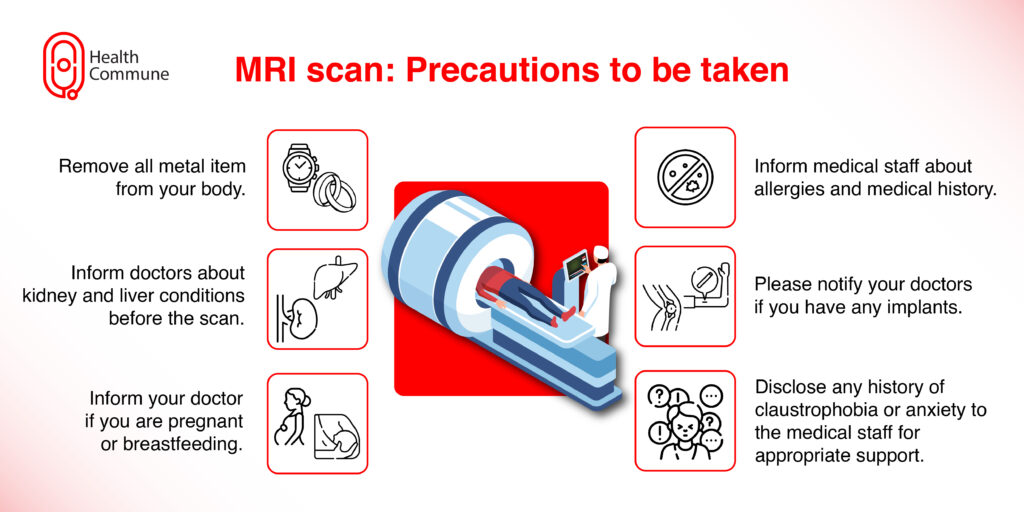Undergoing an MRI scan? Here are some key facts to know before you take the scan. Discover what an MRI is, its indications, risks, precautions, and more.
What is an MRI scan?
What is the purpose of an MRI scan?
- To detect any kind of abnormality in the brain and spinal cord
- To diagnose disorders in the eyes and inner ears
- To assess the heart and blood vessels
- To detect abnormalities of other internal organs such as the kidneys, liver, uterus, pancreas, etc.
- To detect the site, size, extent, and spread of tumours
- To evaluate joints, disc problems, etc
- To evaluate the treatment outcome
What is an MRI with contrast?

What are the risks of an MRI scan?
Since powerful magnets are used in the MRI machine, it is important to remove any metallic objects from your body before you undergo an MRI scan. If you have metallic components implanted in your body (metallic clips, joint prosthesis, cochlear implants, bullets, or nails), there is a risk of them moving within the body and causing harm to other body structures. You can still undergo an MRI scan if these metallic devices are certified as MRI-safe.
You need to inform your doctors about your kidney and liver problems in advance, as it may limit the use of contrast agents during the procedure.
You must also inform your doctor if you suspect that you’re pregnant or are currently breastfeeding. It is unclear if MRI has any adverse impact on your unborn child, but your doctor may prescribe another imaging technique or postpone the imaging if you are pregnant.
How do I prepare for an MRI scan?
You will be asked to wear a hospital gown instead of your regular clothing before the MRI. You will be required to remove all metallic objects from your body, which includes all jewellery, dentures, watches, spectacles, hearing aids, wired bras, hairpins, etc.
You need to inform your doctors in advance about metal-containing objects or medical devices implanted in your body. These include:
- Heart pacemaker or defibrillator
- Metallic joint prostheses
- Cochlear or any other implants
- Aneurysm clips and coils
- Metal fragments in your body
- Electronic or implanted stimulators such as deep brain stimulators or bladder stimulators
- Filters like blood clot filters, etc.
You should inform your doctor if you have medicine patches, continuous glucose monitors, or insulin pumps attached to your body. Also tell them if you are pregnant, unable to lie on your back for 30 to 60 minutes, or if you are claustrophobic.
What happens during an MRI scan?
An MRI scan typically takes between 30 minutes to 1 hour to be completed.You will lie on the bed, and it will move inside the machine. An MRI machine is like a tunnel. You may hear loud clicking and locking sounds while the image is being recorded. You can wear earplugs or listen to music to help overcome claustrophobia. You may experience a slight warmth over the area that is being scanned. This is normal. You will have to stay still throughout the procedure to ensure that the final image is without any distortion. You may experience slight discomfort in the area where the needle is inserted for injecting the contrast; there may be mild bruising later. After the procedure, you will be discharged from the MRI room. Drink plenty of water to flush out the contrast agent from the blood.
How do I overcome claustrophobia while undergoing an MRI scan?
Being inside the MRI room may be claustrophobic for some people. To overcome claustrophobia, keep your eyes closed. Using a blanket was shown to be helpful for some people to overcome claustrophobia. In addition, you could use earplugs to block the sounds or listen to music while the procedure is underway.
If you face severe difficulties, your doctor may be able to give you a mild sedative that helps you relax.





